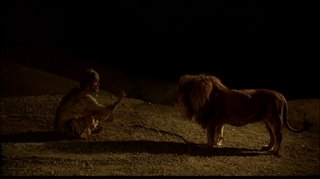Canonball #993: The Last Temptation of Christ
 USA, 1988
USA, 1988Starring Willem Dafoe, Harvey Keitel, Barbara Hershey
Adapted by Paul Schrader from the novel by Nikos Kazantzakis
Directed by Martin Scorsese
Jesus H. Christ, they got it right!
National Geographic sez that they've uncovered the Gospel of Judas. A codex found in Egypt in the Seventies turned out to contain a number of early Christian texts, and after carbon dating, ink testing etc. it appears genuine. It's a translation of the original text, probably written sometime during the second cenutry A.D. And its most notable claim is that Judas betrayed Jesus because Jesus asked him to. Well, Kazantzakis came up with the same idea in 1951, and Scorsese and Schrader brought it to mainstream attention amidst much moral indignation, almost twenty years ago.
The relative lack of controversy about the rediscovered document makes me wonder what all the fuss was about the movie. I thought the whole point of Jesus was that, unlike all those other gods, he was human. If his temptations were to mean anything, there had to be the possibility that he would cave in to Satan. But of course this is impossible because God planned all of this out in advance, which makes you wonder why He bothered... aargh, omniscience makes my head hurt. It probably makes Scorsese's head hurt too, though that doesn't stop him from taking his subject very seriously, and that's probably for the best, since it's unlikely he could've topped Life of Brian.
Pauline Kael said of the Greatest Story Ever Told: "The only thing that gives it plausibility is, psychologically, not very attractive... it's got a bad ending that doesn't make sense after those neat miracles." That the revised ending presented here actually kinda sorta makes a little sense maybe is a measure of Scorsese's storytelling mastery. As in Kundun, he sweeps us along with ritual and primal imagery; what the point is, in the end, is less clear. He's obviously thought deeply about something, though it's tricky to pin down what that thing is. I'd guess that Schrader had distilled the novel into a nice spirit-vs-flesh schema and Marty didn't quite buy it. What lingers is a sense of Jesus as a human being, flesh and desire, frail as a mortal -- only through God are all things possible.
A

0 Comments:
Post a Comment
<< Home